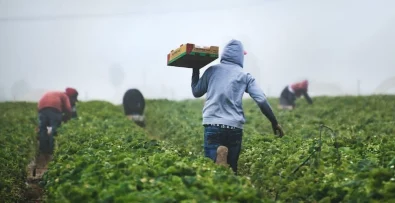In the U.S., it is legal for children as young as 12 to work unlimited hours outside of school with parental approval if they’re working in agriculture. There are currently around 500,000 children who work in agriculture, planting, picking, and packaging crops.
Even children protected by the American Fair Labor Standards Act (FLSA) are at risk of being exploited by employers breaking the law. Reportedly the number of children employed in violation of U.S. child labor laws increased by 37% in 2022.
Child labor exploitation leads to school drop outs
Worse yet, worker shortages and supply chain challenges have companies and lawmakers trying to beat back the minimal existing child labor protections.
As the hours for child labor get extended, school drop out rates increase with kids unable to upkeep their work and study schedules.
Melissa Hope Ditmore, author of Unbroken Chains: The Hidden Role of Human Trafficking in the American Economy, told TruthOut,
“Kids who come from El Salvador, Honduras or Guatemala do not find their way to Iowa by accident,” she says. “They either know someone who is already there, perhaps a family member or someone from their hometown who agrees to be their sponsor, or they’re offered a job by someone — a middleman — who has a vehicle and says that he’ll take them to a farm, factory, or other worksite. Sometimes these middlemen hang out at children’s detention facilities or immigration holding centers and recruit people the minute they’re released. The vast majority of kids drop out of school; even if the sponsor promises to enroll them, they don’t always follow through.”
“Most people want to be honorable, and even if they suspect that the debt is bogus, they want to be free of it. They may not be in actual debt bondage, but they may fear that they or their families will be harmed if they don’t pay. There is no safety net for these kids, and it is not uncommon for them to go hungry or fall in with people who exploit them. Going to school may not even be on their radar.”
To address child labor exploitation, address poverty
Reid Maki, coordinator of the Child Labor Coalition, is adamant that child labor exploitation would be less likely to happen if people were paid adequate wages. He says, for instance, that paying agricultural workers by the bucket instead of by the hour to pick crops encourages risk taking. “It’s inhumane. If adults were paid an adequate hourly rate, it would make an enormous difference, and families would be able to keep their kids in school. If they ended the piece rate, I believe child labor on farms would be reduced or even disappear.”
“Everyone says they want to protect children from labor exploitation but … until we eliminate poverty, we are not really addressing the problem.”







Freedom United is interested in hearing from our community and welcomes relevant, informed comments, advice, and insights that advance the conversation around our campaigns and advocacy. We value inclusivity and respect within our community. To be approved, your comments should be civil.
and they ask why the unemployment rate is so high